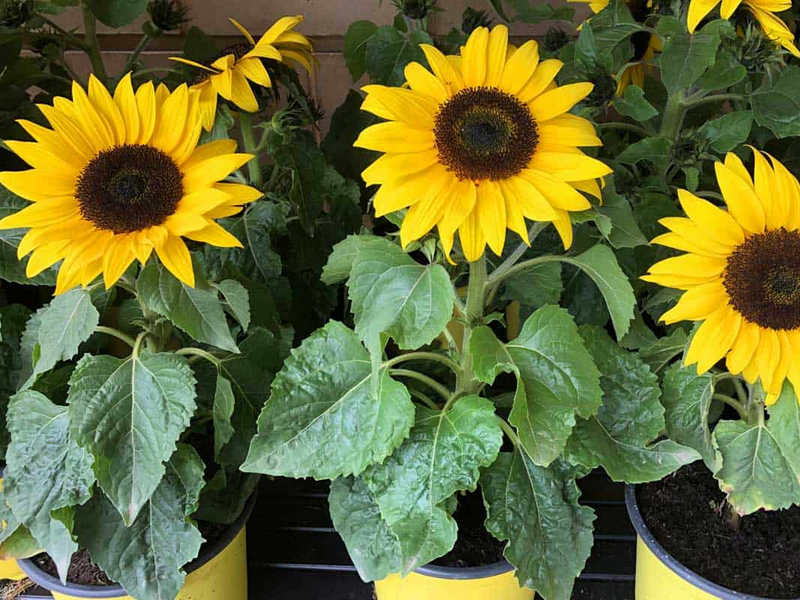Dwarf Sunflower
Helianthus annuus dwarf
Click here to download a PDF of this plant information page (for printing).

Sun Exposure: Full Sun
Season of Interest: Summer
Bloom Time: July - August
Bloom Color: Yellow / Dark Center
Height: 1 to 2 ft.
Spread: 18 in.
Spacing: 24 in.
Water Needs: Average
Maintenance: Minimal
Soil Type: Clay, Loam, Sandy
Soil pH: Acidic, Neutral, Alkaline
Soil Drainage: Well drained
Pests: Deer and Rabbits (while very young)
Diseases: Leaf spot
Wildlife: Bees, Butterflies, Birds

Description:
Take this flower's name to heart and plant your sunflowers where they will receive full sun. Six hours a day is required for general vigor, but 8-10 hours is even better, providing the energy needed to produce strong stems. If your property has a sunny area close to a windbreak, choose this site otherwise it is a good idea to either stake them or mound dirt around the base as they grow to prevent them from being blown over during a storm. Sunflowers are low maintenance plants that thrive in poor soil. For more information see:
plants.ces.ncsu.edu/plants/helianthus-annuus
Care and Growing Tips:
Keep your sunflowers weeded, as weeds not only compete for nutrients but also introduce insect pests that may bring fungal diseases to the flower garden. Combine your fertilizing and watering chores by feeding your sunflowers twice a week with diluted fish emulsion or another balanced flower fertilizer. Small plants only need a couple of gallons of this nourishing drink per week, but as the plants surpass you in height, they will triple their thirst.
When the petals of your sunflowers begin to shrivel, the plant has reached its peak height. Save seeds from the largest several plants, and plant the largest seeds (with the most life-sustaining endosperm) next season to increase your giant sunflower growing success. In this way, you will improve each generation by selecting the largest and most vigorous flowers to replant.
Sunflowers are treasured for their oil-rich seeds, both for animal food and as snacks. When the petals wither and the bloom's beauty has faded, you must protect the developing seeds from hungry scavengers with some fine netting or cheesecloth fastened with a rubber band. When the back of the bloom turns brown the seeds are ready to eat or to store in a cool, dry place for winter bird feeding. Or you can skip the netting and watch the birds eat the seeds directly from the seedhead.